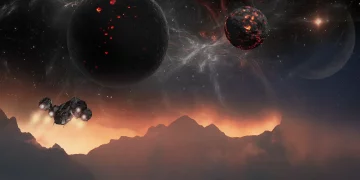In the grand theater of human ambition, we often find ourselves caught between two forces: the pursuit of unattainable horizons and the sense that we might just be running in circles. The phrase “chasing horizons” evokes a timeless image of yearning for something greater, something beyond the immediate grasp—yet, the very nature of a horizon is that it recedes as we approach, leaving us with the impression of a chase that never truly ends. But is this an accurate metaphor for human endeavor? Or, are we merely in a cyclical dance, running in circles, unable to escape the gravitational pull of our own limitations and desires?
The Allure of Horizons: A Promise of More
The horizon is one of the most enduring symbols of human aspiration. It’s an object of mystery, a line that promises new possibilities just beyond our reach. For centuries, explorers set out to conquer horizons—both literal and metaphorical—believing that to push the boundaries of knowledge and discovery was to fulfill humanity’s highest potential.
The ancient Greeks, for example, envisioned the horizon as a boundary separating the known world from the unknown. This boundary was not just a geographical concept but a philosophical one as well. The “horizon of knowledge” symbolized the limits of understanding—forever extending, always promising new vistas of intellectual or spiritual awakening. The promise of the horizon, then, is this: by chasing it, we transcend our current limits and achieve greatness.
In many ways, our modern world still operates on this same principle. The idea of progress, of moving forward toward a distant ideal or goal, is ingrained in the fabric of our societies. Technological advances, scientific discoveries, and even social movements are driven by the belief that we are moving toward something better, something just beyond the current landscape.
However, there is an unsettling question that lingers behind this pursuit: is the horizon really an achievable destination, or is it an illusion—an ever-receding line that we will forever chase, never quite reaching?
The Paradox of the Horizon

To understand why the horizon is both alluring and elusive, we must first recognize its paradoxical nature. A horizon is, by definition, a boundary that cannot be reached. It is not a place that can be physically attained, but a concept that points beyond the present. The more we move toward it, the more it shifts, pushing further away with each step.
This paradox is not unique to the horizon but extends to many of humanity’s great pursuits. Consider the idea of perfection. Perfection is an ideal, a distant goal that we often believe we can attain if we just push ourselves a little harder, work a little longer. Yet, just as with the horizon, perfection seems to remain ever out of reach. In this sense, the horizon becomes a metaphor for the unattainable goals we set for ourselves—goals that may drive us to push our limits but never allow us to fully realize them.
This endless striving can lead to frustration and disillusionment. If we continually chase an ideal that we can never reach, is the pursuit itself meaningful? Or are we simply running in circles, trapped in an unending loop of desire and disappointment?
The Circle of Human Endeavor
If the horizon represents a distant goal that may never be fully realized, then perhaps it is time to consider the possibility that we are, in fact, running in circles. Human history, in many ways, is a cyclical pattern of attempts and failures, progress and regression, with certain patterns repeating themselves across generations. Whether it’s the rise and fall of civilizations, the recurrent cycles of boom and bust in economies, or the constant battle between innovation and stagnation, we seem to be caught in a loop that defies the very notion of linear progress.
One only needs to look at the history of science to see this cyclical pattern. Early pioneers like Galileo and Copernicus ushered in a new era of understanding, challenging the old worldview. Yet, for every breakthrough, there is often a counter-movement that seeks to preserve the old ways, as seen in the backlash against scientific discoveries, from the heliocentric model of the solar system to modern debates around climate change. It’s as if each new horizon of knowledge is met with resistance—creating a cycle of advancement followed by retrenchment, progress followed by regression.
Similarly, the social and political realms often display circularity. Revolutionary movements, for instance, can lead to a new order that eventually mirrors the injustices or flaws of the system it replaced. The French Revolution sought to overthrow monarchic tyranny, yet led to the rise of Napoleonic imperialism. The quest for freedom can sometimes create a new kind of oppression, suggesting that we are merely running in circles, repeating the same mistakes, albeit in different forms.
The Concept of ‘Progress’ Revisited
The idea of progress is often framed as a linear journey—a march forward, with each step taking humanity closer to a better, more enlightened future. However, upon closer inspection, this narrative seems overly simplistic. If we view progress not as a straight line, but as a spiral—where each turn takes us back to familiar terrain, but with greater insight—then we might gain a clearer understanding of human advancement.
Consider the technological revolution. While there have undoubtedly been significant leaps in our capacity to manipulate the world around us, many of these advances have also introduced new challenges. The invention of the automobile, for example, has provided unprecedented mobility, but it has also led to traffic congestion, pollution, and the destruction of ecosystems. The development of social media has connected the world in ways previously unimaginable, yet it has also fostered new forms of isolation, misinformation, and polarization.

In this sense, progress might not be about moving in a straight line toward some utopian future, but rather about navigating a series of interconnected cycles. We learn from our past mistakes, only to face new challenges that require further adaptation. The horizon we chase may never be fully attainable, but the pursuit itself may teach us valuable lessons—ones that can help us navigate the circles we inevitably find ourselves in.
The Role of Perspective: Are We Truly Running in Circles?
One of the key elements in this discussion is perspective. From a certain vantage point, it may seem as though we are merely running in circles, caught in a repetitive loop of striving and failing. But if we change our perspective, we may see that these “circles” are not identical. Each revolution represents growth and change, even if it is not immediately apparent.
Take the example of personal growth. Often, people feel as though they are stuck in a cycle of self-improvement, never quite achieving the ideal version of themselves. Yet, when viewed from a broader perspective, it becomes clear that each attempt—each circle—is a step forward, even if the progress is not always linear. Over time, the lessons learned in one cycle can inform the next, gradually leading to deeper self-awareness, greater resilience, and a more nuanced understanding of what it means to live a fulfilling life.
Similarly, in the realm of human history, the idea of progress can sometimes feel frustratingly slow. Social movements like the fight for civil rights or gender equality can seem to move in fits and starts, with victories followed by setbacks. Yet, over time, these movements have created lasting change, even if the path forward has not always been clear or straight.
Conclusion: The Dance of Progress
So, are we chasing horizons, or just running in circles? The answer, perhaps, lies in a combination of both. We are undoubtedly driven by a desire for more—more knowledge, more freedom, more connection. The horizon, in all its symbolic richness, represents the tantalizing promise of something better, something beyond our current state.
At the same time, the very nature of human existence suggests that we are often caught in cycles—cycles of progress and regression, striving and failing, learning and forgetting. But these circles are not necessarily negative. Rather, they are part of a larger dance of human progress—one in which each turn brings new insights, new challenges, and new opportunities for growth.
Ultimately, the chase itself—the act of striving toward the horizon—may be just as important as the destination. Even if the horizon always recedes as we approach it, the journey teaches us something invaluable about who we are, what we want, and what it means to be human.























